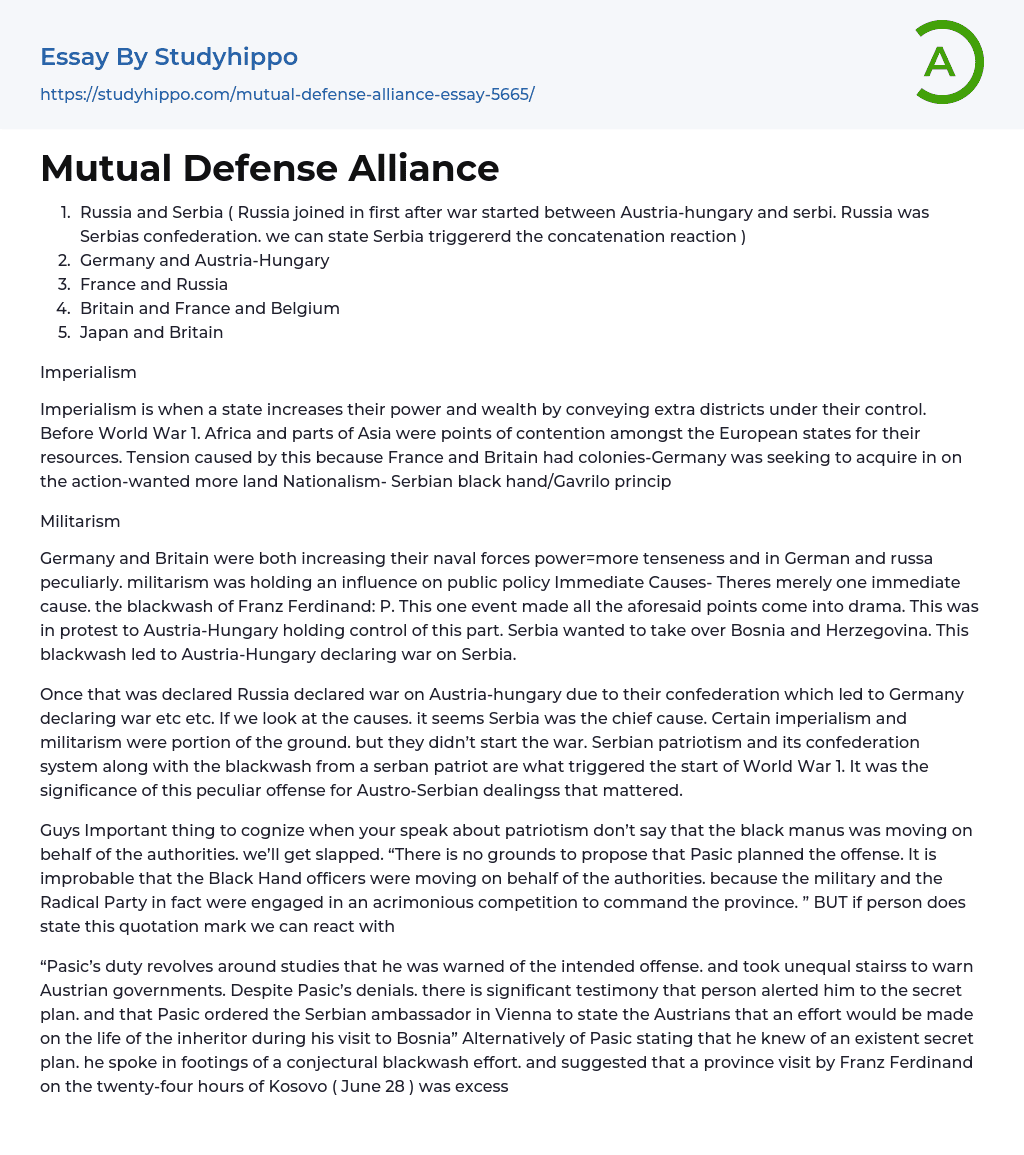- Russia and Serbia (Russia joined in first after war started between Austria-Hungary and Serbia. Russia was Serbia's confederation. We can state Serbia triggered the concatenation reaction.)
- Germany and Austria-Hungary
- France and Russia
- Britain and France and Belgium
- Japan and Britain
Imperialism
Imperialism is when a state increases their power and wealth by conveying extra districts under their control. Before World War 1, Africa and parts of Asia were points of contention amongst the European states for their resources. Tension caused by this because France and Britain had colonies-Germany was seeking to acquire in on the action-wanted more land Nationalism- Serbian black hand/Gavrilo princip.
Militarism
Germany and Britain were both increasing their
...naval forces power=more tenseness and in German and Russia peculiarly. Militarism was having an influence on public policy. Immediate Causes- There's merely one immediate cause.
The blackwash of Franz Ferdinand: P. This event was the culmination of all the aforementioned points. It occurred as a protest against Austria-Hungary's control over this region, as Serbia desired to obtain power over Bosnia and Herzegovina.
This blackwash resulted in Austria-Hungary's declaration of war on Serbia. As a consequence, Russia declared war on Austria-Hungary due to their alliance, which then led to Germany's declaration of war, and so on. Upon examining the causes, it appears that Serbia was the primary cause. Additionally, imperialism and militarism played a significant role.
However, the war was not started by them. The commencement of World War 1 was triggered by Serbian patriotism and its
confederation system, along with the blackwash from a Serbian patriot. The importance lied in the offense's impact on Austro-Serbian relations. It is crucial to understand, when discussing patriotism, not to claim that the black hand was acting on behalf of the government, as it may result in consequences.
“There is no evidence to suggest that Pasic orchestrated the crime. It is unlikely that the Black Hand officers were acting on behalf of the government, as the military and the Radical Party were actually competing for control over the province.” HOWEVER, IF someone does make this claim, we can counter with, “Pasic’s role centers around reports that he had been alerted about the planned crime and took inadequate steps to inform Austrian authorities. Despite Pasic’s denials."
There is substantial evidence that someone informed him about the secret plan, and that Pasic instructed the Serbian ambassador in Vienna to notify the Austrians that an attempt would be made on the life of the heir during his visit to Bosnia. Instead of directly stating that he was aware of an actual plan, Pasic phrased it as a hypothetical assassination attempt, and implied that a state visit by Franz Ferdinand on the day of Kosovo (June 28) would be too provocative. Austrian diplomats failed to decipher the hidden meaning behind this vague statement. By the time the warning reached the Habsburg joint finance minister (who was responsible for Bosnian affairs), any sense of urgency had already faded.
He did nothing to enhance security or cancel the planned visit of the heir. After the killings, the Serbian authorities were even more unwilling to compromise themselves by admitting any prior knowledge. This led to
Pasic's subsequent denials.
This is similar to the ultimate historiography.
The ultimatum was initially received by Serbia. Pasic expressed his willingness to accept its conditions, with some reservations and requests for clarification. However, as time went on.
It was evident that Russia would support Serbia no matter the situation, causing Pasic to abandon the pursuit of peace. Although a lengthy response was written and sent, Serbia declined the fundamental aspects pertaining to Austrian involvement in its internal legal and law enforcement matters.
Pasic was aware that this signified the start of a war, and the Serbian ground forces commenced mobilization even before obtaining a response. ^– From "The Balkans in the Age of Nationalism" by Steven W. Sowards
- Cuban Missile Crisis essays
- Fidel Castro essays
- French Revolution essays
- Han Dynasty essays
- Hiroshima essays
- Imperialism essays
- Jack The Ripper essays
- Mao Zedong essays
- Middle Ages essays
- Mongols essays
- Nelson Mandela essays
- Ottoman Empire essays
- Reformation essays
- Reign of Terror essays
- Renaissance essays
- Roaring Twenties essays
- Romanticism essays
- Samurai essays
- Scientific Revolution essays
- Soviet Union essays
- Absolutism essays
- Appeal essays
- Bourgeoisie essays
- Contras essays
- Corporate Governance essays
- Corruption essays
- Democracy essays
- Democratic Party essays
- Developed Country essays
- Dictatorship essays
- Elections essays
- European Union essays
- Federalism essays
- Foreign essays
- Foreign policy essays
- Gentrification essays
- Hillary Clinton essays
- Income Tax essays
- International Relations essays
- John Marshall essays
- John Stuart Mill essays
- Left-Wing Politics essays
- Liberty essays
- Military essays
- Monarch essays
- Monarchy essays
- Political Corruption essays
- Political Party essays
- Political Science essays
- President Of The United States essays




